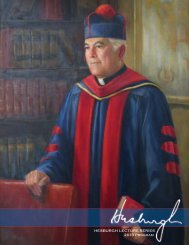HESBURGH LECTURE SERIES 2012 Program - Alumni Association ...
HESBURGH LECTURE SERIES 2012 Program - Alumni Association ...
HESBURGH LECTURE SERIES 2012 Program - Alumni Association ...
You also want an ePaper? Increase the reach of your titles
YUMPU automatically turns print PDFs into web optimized ePapers that Google loves.
Rev. Patrick D. Gaffney, C.S.C., Ph.D., ’69, ’70 M.A.,<br />
’73 M.Div.<br />
Associate Professor, Anthropology; Fellow, Kroc Institute for<br />
International Peace Studies, Kellogg Institute for International<br />
Studies<br />
Biography<br />
Rev. Patrick Gaffney specializes in social and cultural anthropology with a strong interest<br />
in religion, politics, systems of authority, social movements, language and culture, symbolic<br />
representation, ideology, violence, conflict resolution, human rights, and ritual expressions.<br />
He has extensive field experience in the Middle East, notably the Arab world, as well as in<br />
the Great Lakes region of Africa. His current research concentrates on religion, violence, and<br />
reconciliation in the context of strained ethnic relations and the breakdown of political and<br />
economic order in central Africa. He has published The Prophet’s Pulpit: Islamic Preaching in<br />
Contemporary Egypt, (University of California Press, 1994), and he is a co-author of Breaking<br />
Cycles of Violence: Conflict Prevention in Interstate Crises (Kumarian, 1999). Gaffney also has<br />
published numerous articles dealing with Islamic resurgence, ethnic conflict, and inter-religious<br />
relations in the Middle East and central Africa.<br />
Lecture<br />
Understanding Jerusalem: City of Promises, Passions, and Pilgrims<br />
All three of the world’s great monotheistic faiths–Judaism, Christianity, and Islam–revere Jerusalem as a historical center and<br />
as a sacred symbol. But each of these traditions holds a distinctive view of why it is so important and how their claims are<br />
justified. Although the veneration of this sacred site is very old (in fact, predating its capture by the biblical king David, who<br />
built his capital there on Mount Zion) the nature of today’s conflict has far more recent causes. The emergence of two modern<br />
nationalist movements, one Jewish and one Palestinian, both aspiring to create a homeland in this same territory, has led to a<br />
protracted confrontation with its focus increasingly on the fate of this city. A heady mixture of ideology and faith has evolved and<br />
hardened over roughly the last half century resulting in a highly volatile situation. Finding peaceful ways for Muslims and Jews<br />
to share Jerusalem presents what is probably the greatest challenge for those who seek to resolve the Middle East conflict. This<br />
lecture traces the main currents of the political, religious, and legal arguments that underlie this international and interreligious<br />
contestation with special attention to the Christian presence in the Holy Land and the singular role that Christians may play to<br />
bring a just and lasting solution to this city of peace.<br />
44 The Hesburgh Lecture Series, <strong>2012</strong> <strong>Program</strong><br />
Categories<br />
Government, History, Social<br />
Concerns



